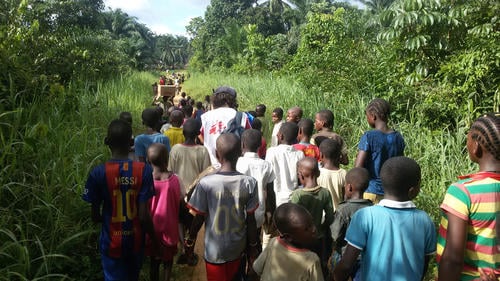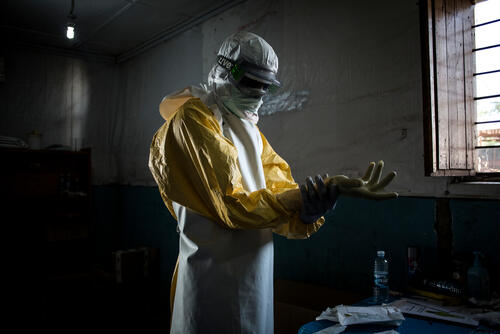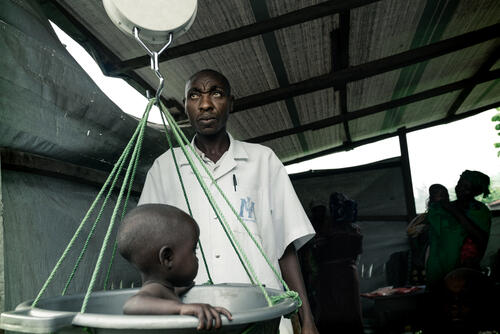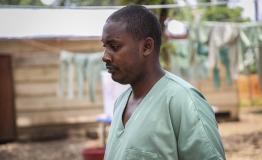Paul Jawor, an MSF water and sanitation expert, has just returned from Equateur province in the Democratic Republic of Congo (DRC). Paul was working in and around the remote village of Iboko, where cases of Ebola have been confirmed. He explains the challenges MSF teams are facing on the frontline of the ongoing outbreak.
“We arrived in Mbandaka city by plane in the morning on 20 May. Mbandaka is the main city of the province where the current Ebola outbreak has been declared. Some cases have been reported in the town and MSF has set up an Ebola treatment centre (ETC) in response. But our team’s job was to go and start an intervention in and around Iboko, a very remote village about 120 kilometres south of Mbandaka, where a patient had just been confirmed as infected with the Ebola virus.
With an outbreak like this, it’s a race against time
There was no helicopter available for two days, so we hit the road an hour after landing, with three rented cars, full of all the provisions and materials we could find. With an outbreak like this, it’s a race against time, as one Ebola patient with symptoms can infect several people every day. The best way to contain the disease is to put all measures in place as soon as possible. And so the race was on.
It was a long journey and we arrived in Itipo, a village on the way to Iboko which has also been affected by the outbreak, at night after having suffered mechanical problems and having to repair numerous broken wooden bridges along the way. One of our vehicles even drove off the edge of a bridge and it took us what seemed like hours to put it back on track in the dark.
After spending the night in tents on the terrace of a nunnery, we set off again for Iboko, a further two to three hours’ drive away.
The villagers welcomed us, but we could see they were very scared of the disease
Iboko is a village made up of mainly grass huts with a church in the middle. It has a functioning hospital that serves a large area and numerous surrounding villages. My colleagues met with the community and its leaders to explain what we were coming to do and to raise awareness about Ebola, its transmission mode and the sanitary measures to take for prevention. The villagers welcomed us, but we could see they were very scared of the disease.
On my side, I enrolled some local staff and we focused on one of the first priorities: building an isolation ward, along with its latrine, shower room, dressing and undressing rooms, as well as a waste management area. This was done in a deserted building with five rooms, near the health centre. It was ready in 24 hours and could already receive suspected Ebola patients, who would be tested for the virus and receive initial care.
Any confirmed cases would be, for now, transferred to the Bikoro ETC. Over the following days we planned and started building a 13-bed ETC that could be extended to 26 beds if needed. This meant that Ebola-confirmed patients could be treated in Iboko itself.
Building an ETC is quite complex; everything has to be built meticulously in order to avoid cross-contamination between patients - both suspected and confirmed cases - healthcare workers, their families, and the population living nearby.
One of the main challenges we face in this outbreak is that, despite our awareness-raising efforts in the community, people with Ebola-like symptoms don’t want to come and be tested. Some of them also live far away from the ETC and prefer to stay at home. But this can be dangerous for the people caring for them. Caregivers could easily be infected and become the next suspected case.
We are taking the maximum number of precautions
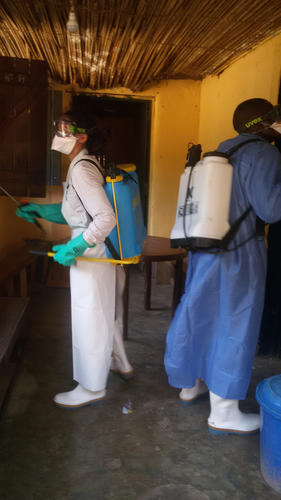
One woman who had been confirmed as having Ebola died in a village called Bobale, 19 kilometres from Iboko, after she had chosen to stay at home. We were quickly notified and an MSF colleague and I, along with a member of the Red Cross went there to make sure the woman’s body, very infectious at that moment, would be taken care of with all the necessary precautions, while trying to respect the local customs.
Night was falling by the time we arrived in Bobale. I was to disinfect the woman’s house and put her in a safe body bag that would go into a sealed coffin which the community had made. But as it was dark, there wasn’t enough light to enter the house safely without the risk of tearing my protection suit on sharp objects. So we decided to postpone the operation until the next morning.
It took me an hour, sweating in my protection suit, to spray the house and disinfect the woman’s body in a respectful way, under the eyes of her husband who was also wearing some protection. Then I collected all the clothes, sheets and other possibly contaminated materials into a bag that I sprayed with chlorine. That was in turn put into another bag, sprayed again, and put into another bag. It was then taken back to our ETC in Iboko and burnt. In order to avoid spreading the disease, we are taking the maximum number of precautions.
I left DRC a few days ago and other MSF colleagues have since joined the fight against Ebola. The main challenge will be convincing people to seek care at the treatment centres, especially in remote areas like Iboko. We must spare no effort to ensure that communities know how to protect themselves from the spread of this disease.”



